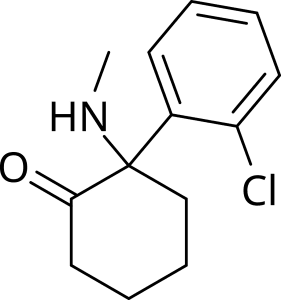We're in Beta 🙃
Are you considering the use of ketamine for anxiety relief? If so, you're not alone. Ketamine is quickly being considered a game-changer for a number of mental health conditions.
It's important to mention that the FDA has not officially approved ketamine for anxiety treatment.
However, doctors and therapists may still administer "off-label" ketamine to treat anxiety. This is known as ketamine therapy, and the research on its potential benefits has caught attention.
Here's a closer look into the science, effects, and promising treatment options of Ketamine for anxiety.
What is Ketamine?
Ketamine was first developed in 1962 and was first approved for human use in the 1970s. It initially gained its popularity as an anesthesia medicine during the Vietnam War1.
Early on, ketamine was prized for delivering pain relief and sedation while maintaining heart rate and blood pressure—quite useful benefits when treating injuries on the battlefield.
Since then, it's continued gracing the halls of operating rooms everywhere as an easy, gentle yet effective anesthetic.
More recently, ketamine has entered the forefront of mental health.

Individuals and therapists have begun turning to ketamine for anxiety, major depression, PTSD (Post Traumatic Stress Disorder), and other mood disorders.
The distinctiveness of ketamine is that it acts differently than other drugs commonly used to treat mental health challenges.
The Chemical Side of Things

Ketamine belongs to a class of drugs known as dissociative anesthetics which include PCP (phencyclidine) and dextromethorphan (DXM). What makes them 'dissociative' is their tendency to make users feel detached or disconnected from reality – hence the term 'dissociate'. This quality can be both beneficial and risky depending upon how you use it.
In terms of chemistry, ketamine works by blocking NMDA receptors in your brain. These are crucial channels through which glutamate - our primary excitatory neurotransmitter – communicates between neurons2. By inhibiting this interaction, ketamine disrupts normal neuronal function causing effects ranging from mild perceptual changes to complete sensory shutdown at higher doses.
Schedule III Controlled Substance
While there’s no doubt about its potential therapeutic benefits, we must not overlook one fact: Ketamine is a Schedule III controlled substance under the Controlled Substances Act.
This classification means it has accepted medical use but also potential for abuse and dependence.
While we talk about its therapeutic applications, we will also address common concerns and precautions for safe usage.
The Science Behind Ketamine's Effects
While not all of us were science buffs in high school, delving into psychedelics—and especially to understand their effects—may require a look into sciences such as molecular biology and neuroscience.
If we're open to them, these sciences give us this fascinating window into a Wonderland where molecules become the architects of hope, and the brain's mysteries unfold.
"As we apply sciences such as molecular biology and neuroscience to psychedelics like ketamine, we are given this fascinating window into a Wonderland where molecules become the architects of hope, and the brain's mysteries unfold."
![]()
Armed with the science, we can traipse into psychedelic Wonderland and understand how a dissociative psychedelic compound like ketamine might actually produce meaningful relief from symptoms of anxiety.
How? It comes down to the brain and its chemical messengers.
Ketamine has been shown to stimulate the growth of new neural connections, which can be particularly beneficial for those dealing with anxiety disorders.
Think of your brain like a city - if some roads are blocked or damaged (which often happens in people suffering from mental health or trauma conditions), you need to build new ones.
That’s exactly what ketamine helps do in your brain.
The Role of Glutamate
In this complex process, one key player is glutamate—a major neurotransmitter that sends signals across neurons. It's kind of like the mailman delivering letters between houses—except here, 'houses' are nerve cells.
Research suggests that people struggling with anxiety might have overactive glutamate signaling leading to an overload on their nervous system3.
If this is true, anxious feelings, worry, or spinning thoughts of concern could simply be too many "letters" delivered at once, i.e. information overload.
What ketamine does is modulate this glutamate activity—it essentially tells the mailman when enough letters have been sent and to come back another time.
This is a key factor for why ketamine is used for anxiety.
NMDA Receptors and Neuroplasticity
Ketamine achieves its effects by interacting with N-Methyl-D-aspartate (NMDA) receptors located throughout our brains. When these receptors get stimulated by substances like ketamine, they kickstart neuroplasticity—the ability for our brains to change and adapt over time.
Increasing our brain's ability to adapt can contributee significantly towards reducing anxiety symptoms.
Rapid-Acting Effects & Anxiety Relief
Traditional anxiety medication can take weeks to kick in. Thanks to its rapid-acting effects, ketamine can potentially life your spirits and reduce or alleviate symptoms of anxiety within hours.
These effects are not reported in absolutely everyone, nor are they necessarily permanent. However ketamine is making its way into the professional arsenal of tools for addressing and resolving anxiety.
Benefits of Using Ketamine for Anxiety
While there's a range of medications used in anxiety treatment, studies indicate that roughly 50% of individuals receiving treatment for generalized anxiety disorder (GAD) are considered "treatment-resistant"4.
This means half of all people receiving anti-anxiety medication treatment don't experience any noticeable improvements in their condition after treatment.
A growing consensus among experts suggests that ketamine could potentially offer a valuable alternative for those grappling with anxiety that hasn't responded favorably to other conventional approaches.
Below are just some of the ketamine results for anxiety:
🫠 Rapid Symptom Relief
The first benefit that stands out when using ketamine to treat anxiety is its rapid effect on symptoms5 compared to conventional antidepressants or anti-anxiety medications. This means individuals can potentially experience symptom reduction within hours after receiving their dose rather than waiting weeks which other meds may require.
This could be especially beneficial during acute episodes of panic attacks or heightened stress levels where immediate intervention becomes necessary.
🤩 Potential Long-Term Improvements
Regular sessions of controlled ketamine administration under professional supervision are beginning to demonstrate long lasting impact on chronic anxiety conditions.
For example, studies show a marked decrease in depressive and anxious symptoms over time6 with maintained improvement even after cessation of treatment.
😬 Ketamine Use for Treatment-Resistant Cases
According to a study published in the British Journal of Clinical Pharmacology, ketamine infusion therapy demonstrated rapid and significant reductions in anxiety symptoms in individuals previously deemed treatment-resistant7.
Similarly, a meta-analysis in the The American Journal of Psychiatry revealed that ketamine exhibited substantial antidepressant effects in treatment-resistant depression cases8.
😖 Regarding Suicidality, Mood Disorders & Cognition
Research has shown that ketamine administration can lead to rapid and robust improvements in mood—particularly in the context of actual mood disorders—and has shown to be effective even for suicidality and PTSD9.
Additionally, according to one Columbia University study published in the Journal of Clinical Psychiatry, ketamine improved the thinking and reasoning of those who expressed thoughts of killing themselves within 24 hours10.
Researchers followed 78 participants suffering clinically significant suicidal ideation with major depressive disorder. They found that administering a standard dose of intravenous (IV) ketamine produced rapid improvement of suicidal thoughts in some individuals.
What was equally striking about their findings was that this reduction in suicidal ideation correlated with improvements in problem-solving and thinking more clearly.
“Our study helped us gain a better understanding of how ketamine works in the brain and how quickly it can improve distorted thinking,” said Ravi. N. Shah, MD, Chief Innovation Officer, Columbia Psychiatry. “Being able to think more clearly can make someone feel less suicidal.”
Our study helped us gain a better understanding of how ketamine works in the brain and how quickly it can improve distorted thinking... Being able to think more clearly can make someone feel less suicidal.
Potential Risks & Side Effects
While ketamine holds promise as a treatment for various conditions, there are potential risks and side-effects to be aware of.
Research indicates that ketamine, when used improperly or in excessive amounts, can lead to adverse effects, including: nausea, vomiting, disorientation, and an altered sense of perception11.
Additionally, ketamine's dissociative properties mean that it can sometimes lead to a 'k-hole' experience, characterized by intense hallucinations and a feeling of being disconnected from reality.
Moreover, long-term or frequent use of ketamine may have adverse effects on cognitive function and urinary health. Research has suggested that heavy and prolonged ketamine use can result in a condition known as 'ketamine bladder syndrome,' which can lead to urinary tract problems12.
It is important to note that the majority of risk assessment and reported side-effects of ketamine use are in the context of habitual, recreational use outside of clinical usage.
That said, for the safest results, ketamine should be used under the guidance of a qualified medical professional who can monitor its administration and assess individual suitability.
Possible Short-Term Side Effects
Ketamine can trigger a variety of short-term experiences that different people may either enjoy or dislike.
Here we will focus on a clinical context for usage and highly recommend that you approach ketamine for anxiety in a structured treatment program supervised by trained and experienced clinicians.
If they treat with psychedelics, chances are they are a friend to the psychedelic, healed and happy state you're after!

That way, you can address any concerns you may have and modify your treatment plan as any unwanted effects arise.
Short-term side effects may show up during a treatment session, or within a few hours following a session.
Some short-term side effects of ketamine use may include:
- Disorientation or confusion
- Headache
- Increased heart rate and elevated blood pressure
- Nausea or vomiting
- Drowsiness
- Anxiety, depression, or worsening of these
- Increase in irritability
- Stress
- Dissociation
Potential Long-Term Risks
We do not yet know the potential long-term risks of ketamine use in a supervised clinical treatment environment.
Because ketamine use does affect the kidneys, we find it important to list the potential long-term risks. Just be aware that the following risks are mostly associated with habitual, recreational use.
Potential long-term risks of ketamine use:
- Kidney damage
- Trouble or pain urinating
- Substance dependence and tolerance
- Baseline increases in heart rate and blood pressure
- Respiratory challenges
- Possibility of seizures
- Degraded memory
- Changes in sleep habits
Ketamine Treatment Options
Ketamine treatment comes in various forms, tailored to one's needs and preferences. Options for ketamine treatment include:
1. IV Infusions: Intravenous (IV) infusions are perhaps the most common and well-established method for administering ketamine. This method involves the slow and controlled introduction of ketamine directly into the bloodstream, offering rapid relief.
It's typically administered in a clinical setting, ensuring precise dosage and safety.
2. Intramuscular Injections: This method involves injecting ketamine into a muscle, allowing for a slower release into the bloodstream. The onset of relief may be slightly slower compared to IV infusions.
3. Nasal Sprays: Nasal sprays are gaining popularity as a convenient at-home option. They offer a non-invasive way to self-administer ketamine. While they may take a bit longer to take effect compared to IV or IM methods, they provide flexibility and privacy.
4. Oral Ketamine: In some cases, ketamine can be taken orally in the form of capsules or tablets. This method is particularly useful for at-home administration as well as for maintenance therapy, allowing individuals to continue their treatment at home.
5. Ketamine Assisted Psychotherapy (KAP): KAP combines ketamine administration with psychotherapy sessions. This integrated approach aims to maximize the therapeutic benefits of ketamine by providing a supportive and structured environment for emotional processing.
Each of these ketamine treatment types has its unique advantages and considerations.
How to Try It
Start by initiating a conversation with the healthcare professional who currently manages your anxiety treatments. They are well-positioned to provide valuable insights and may even be able to refer you to a health specialist experienced in ketamine therapy.
Alternatively, you can venture into the world of ketamine therapy independently.
However, tread with caution. In recent times, standalone ketamine clinics and online services have cropped up with varying degrees of professionalism and expertise. When going down this path, meticulous research is your compass.
Here are some guidelines for safely pursuing ketamine treatment via a clinic:
The American Society of Ketamine Physicians, Psychotherapists, and Practitioners13 offers a set of criteria to consider when choosing a ketamine clinic.
Here's what to keep in mind:
-
Additional Mental Health Services: Opt for clinics that offer a comprehensive approach to mental health. Ketamine therapy often thrives as part of a larger treatment plan. Look for clinics that provide additional mental health support such as group therapy or medication management.
-
Board Certified Physicians: Ensure that the clinic has board-certified physicians on staff, well-versed in fields related to mental health. You can utilize your state's medical board website to verify their licenses.
-
Clinic History: Whenever possible, seek out clinics with a track record, ideally ones that have been open for at least two years. Online reviews can offer valuable insights into the clinic's reputation and patient experiences.
-
Realistic Claims: While ketamine therapy holds immense promise as a potential treatment for various mental health conditions, it's essential to maintain a realistic perspective. Be cautious of clinics that make extravagant claims about the instantaneous effectiveness of ketamine therapy.
-
Thorough Screening: Reputable ketamine clinics prioritize your safety and well-being. They typically require one or two consultations with a healthcare professional to assess whether ketamine therapy aligns with your needs and is safe for you. During these consultations, you'll have the opportunity to discuss your symptoms, treatment goals, and medical history in detail.
If you do opt for at-home ketamine treatment, clinicians recommend that you have someone you trust present and sober, in case you require assistance or support at any point.
FAQ
How fast does ketamine work for anxiety?
Studies and clinical observations have consistently shown that ketamine can start to produce significant reductions in anxiety symptoms within hours of administration, even in some treatment-resistant cases. This swift onset of action is in stark contrast to traditional anti-anxiety medications, which may take weeks or even months to manifest their effects.
How many ketamine treatments for anxiety are necessary?
The number of ketamine treatments required for anxiety can vary significantly from person to person. 4 to 6 sessions are often recommended for an initial series of treatments, often administered over a few weeks. The frequency and dosage of these sessions depend on the individual's response and the clinician's assessment. Some individuals may experience substantial relief after this initial phase, while others may require ongoing maintenance treatments to sustain the therapeutic benefits.
How to get ketamine for anxiety?
Individuals interested in ketamine therapy should begin by consulting with a qualified healthcare professional who specializes in mental health or ketamine therapy. This initial consultation can help you evaluate your suitability for ketamine treatment and discuss your specific symptoms and treatment goals. Healthcare professionals may then provide referrals or recommendations for reputable ketamine clinics or practitioners.
Is ketamine good for anxiety?
A growing body of scientific literature and research studies support ketamine's effectiveness in treating anxiety, including in those who have not responded well to other treatment approaches, and who would be considered 'treatment-resistant.' Multiple clinical trials have noted relief from anxiety symptoms within hours of a ketamine treatment.
TABLE OF CONTENTS
What is Ketamine?
The Science Behind Ketamine's Effects
Benefits of Using Ketamine For Anxiety
Potential Risks & Side Effects
Ketamine Treatment Options
How to Try It
FAQ
REFERENCES
1. Rueda Carrillo, Luis et al. “Ketamine and Its Emergence in the Field of Neurology.” Cureus vol. 14,7 e27389. 28 Jul. 2022.
2. Ionescu, Dawn F et al. “Ketamine-Associated Brain Changes: A Review of the Neuroimaging Literature.” Harvard review of psychiatry vol. 26,6 (2018): 320-339.
3. Abdallah, Chadi G et al. “The effects of ketamine on prefrontal glutamate neurotransmission in healthy and depressed subjects.” Neuropsychopharmacology : official publication of the American College of Neuropsychopharmacology vol. 43,10 (2018): 2154-2160.
4. Ansara, Elayne D. “Management of treatment-resistant generalized anxiety disorder.” The mental health clinician vol. 10,6 326-334. 5 Nov. 2020.
5. Hashimoto, Kenji. “Rapid-acting antidepressant ketamine, its metabolites and other candidates: A historical overview and future perspective.” Psychiatry and clinical neurosciences vol. 73,10 (2019): 613-627.
6. Walsh, Zach et al. “Ketamine for the treatment of mental health and substance use disorders: comprehensive systematic review.” BJPsych open vol. 8,1 e19. 23 Dec. 2021.
7. Tully, Jamie L et al. “Ketamine treatment for refractory anxiety: A systematic review.” British journal of clinical pharmacology vol. 88,10 (2022): 4412-4426.
8. McIntyre, Roger S et al. “Synthesizing the Evidence for Ketamine and Esketamine in Treatment-Resistant Depression: An International Expert Opinion on the Available Evidence and Implementation.” The American journal of psychiatry vol. 178,5 (2021): 383-399.
9. Kritzer, Michael D et al. “Ketamine for treatment of mood disorders and suicidality: A narrative review of recent progress.” Annals of clinical psychiatry : official journal of the American Academy of Clinical Psychiatrists vol. 34,1 (2022): 33-43.
10. Keilp, John G. et al. "Effects of Ketamine Versus Midazolam on Neurocognition at 24 Hours in Depressed Patients With Suicidal Ideation." Journal of Clinical Psychiatry, November 2, 2021.
11. Orhurhu VJ, Vashisht R, Claus LE, et al. Ketamine Toxicity.
12. Srirangam, Shalom, and Joe Mercer. “Ketamine bladder syndrome: an important differential diagnosis when assessing a patient with persistent lower urinary tract symptoms.” BMJ case reports vol. 2012 bcr2012006447. 30 Sep. 2012.

